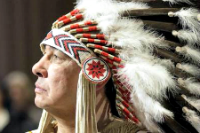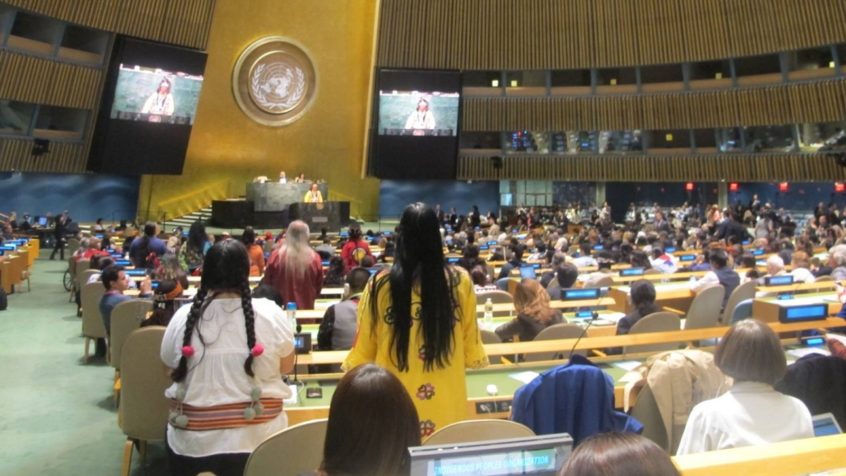Access to the platform
Participants must use their laptop to join the virtual informal meetings, as the Interprefy platform does not support mobile devices. Chrome browser is recommended when accessing the virtual platform link.
The link to join the virtual platform will be sent by e-mail to the participants who are on the list of speakers.
To avoid overloading the platform, participating organizations should limit their participation in the virtual platform to no more than two representatives and only to those sessions in which their organization is on the list of speakers. Participants are encouraged to coordinate virtual participation on the platform among their representatives to ensure that the participation limit of two representatives is respected at any given time. Only those participants who wish to speak in a given meeting should log into the Interprefy platform. All other members of the organization can watch the meetings live on UN Web TV. In the event that participation in the platform is close to capacity, the Chair may authorize the Secretariat to withdraw the participants. There is no limit to the number of people who can follow discussions through ONE Webcast, and the Webcast will be archived.
To help the Chair identify participants on the virtual platform, upon joining the meeting, participants are asked to follow the naming convention format, ie: [ORGANIZATION] [FIRST NAME] [LAST NAME].
If participants do not clearly identify their affiliation when joining the platform, their admission to the meeting may be delayed and they may be required to temporarily leave the meeting and rejoin with the correct naming convention format.
Interactive discussions
The Permanent Forum will hold interactive discussions on topics 3, 5 f) and 5 c) at its informal virtual meetings on April 20, 27 and 28, respectively. Representatives of ECOSOC-accredited non-governmental organizations and indigenous peoples’ organizations have already expressed interest in speaking during the interactive dialogues and will be sent a link to join the session. Depending on the time available, the Chair will call some to intervene.
Given the limited time available and to allow the maximum number of participants to speak, interventions should be limited to no more than two minutes each, or shorter if there are a large number of requests. The time limit will be strictly enforced, including by muting the microphones once the time limit is reached. The Chair may intersperse the interventions of the participating States with interventions of international organizations, representatives of the United Nations system and representatives of non-governmental organizations and organizations of indigenous peoples.
General Discussion
The Chair will conduct the general discussions in accordance with the practice established in previous sessions. Consequently, the list of speakers will rotate between statements by a representative of a Member State, followed by a representative of an intergovernmental organization or UN agency, followed by an indigenous representative. Speakers may only speak once on an agenda item. The time limit for all statements is two minutes. The time limit will be strictly enforced, including by muting the microphones once the time limit is reached. Speakers are encouraged to submit abbreviated versions of their statements.
Below is the provisional list of speakers for general discussion under each agenda item.
Agenda Item 3: Discussion on the theme “Peace, justice and strong institutions: the role of indigenous peoples in implementing Sustainable Development Goal 16”
Tuesday, 20 April 2021
Member States and Observers speaker list statements not delivered due to shortage of time
Agenda Item 7: Future work of the Permanent Forum, including issues considered by the Economic and Social Council and emerging issues,
specifically challenges related to pandemics and responses to them
Wednesday, 21 April 2021
1 Asia Caucus
2 Coordinating Body of the Indigenous Organizations in the Amazon Basin (COICA)
3 Inuit Circumpolar Council
4 Nation of Hawai’i
5 Association of Indigenous Peoples of the North, Siberia and Far East of the Russian Federation (RAIPON)
6 Land is Life
7 Associação Dos Povos Indígenas Karipuna
8 Sámi Parliament in Norway
9 Confederación Sindical Única de Trabajadores Campesinos de Bolivia (CSUTCB)
10 Asia Indigenous Women’s Network and Tebtebba
11 Mujeres Indígenas por la Conservación, Investigación y Aprovechamiento de los Recursos Naturales – RED LAC
12 Forest Peoples Programme
13 United Confederation of Taino People
14 Aty Guasu Kaiowá Guarani
15 Khmers Kampuchea-Krom Federation
16 Negev Coexistence Forum for Civil Equality
17 CONSELHO INDIGENISTA MISSIONÃRIO – CIMI
18 Derecho, Ambiente y Recursos Naturales
19 Anglican Consultative Council
20 Franciscans International
Agenda Item 5 (d): Human rights dialogue with the Special Rapporteur on the rights of indigenous peoples and the Expert Mechanism on the Rights of Indigenous Peoples and the Voluntary Fund for Indigenous Peoples
Thursday, 22 April 2021
1 Asia Indigenous Peoples Pact
2 Indigenous Information Network
3 International Indian Treaty Council (IITC)
4 Consejo Nacional de Ayllus y Markas del Qullasuyu (CONAMAQ)
5 Saami Council
6 New Zealand Human Rights Commission
7 Native Council of Prince Edward Island
8 Associação dos Povos Indígenas Karipuna
9 Association of northern indigenous peopeles of Sakha Republic (Yakutia)
10 SEMILLA WARUNKWA
11 Organisasi Pribumi Papua Barat
12 Consejo Continental de la Nación Guarani
13 Khmers Kampuchea-Krom Federation
14 NGO Yakutia – Our Opinion
15 Human Rights Watch
16 MADRE
17 The Netherlands Centre for Indigenous Peoples
18 Derecho Ambiente y Recursos Naturales
19 Rosa Luxemburg Stiftung – New York Office
20 Maryknoll Sisters of St Dominic, Inc
Agenda Item 6: Thematic dialogues: Follow up to the outcome document of the World Conference on Indigenous Peoples and the 2030 Agenda for Sustainable Development
Friday, 23 April 2021
2030 Agenda for Sustainable Development
1 Fund for the Developments of Indigenous Peoples of Latin America and the Caribbean (FILAC)
2 International Indian Treaty Council (IITC)
3 Asia Indigenous Peoples’ Caucus, Asia Indigenous Peoples Pact (AIPP) and Indigenous Peoples Major Group (IPMG)
4 Russian Association of Indigenous Peoples of the North (RAIPON)
5 Indigenous Peoples Organisation Australia
6 Aty Guasu Kaiowá Guarani
7 Kola Sami Association
8 Khmers Kampuchea-Krom Federation
9 CEM-Aymara
10 CONSELHO INDIGENISTA MISSIONÃRIO CIMI
Follow-up to the outcome document of the World Conference on Indigenous Peoples
1 Sámi Parliament in Finland
2 International Indian Treaty Council (IITC)
3 New South Wales Aboriginal Land Council
4 Association of Indigenous Peoples of the North, Siberia and Far East of the Russian Federation (RAIPON)
5 Assembly of First Nations
6 Mujeres Indígenas por la Conservación, Investigación y Aprovechamiento de los Recursos Naturales – RED LAC
Agenda Item 4: Discussion on the six mandated areas of the Permanent Forum (economic and social development, culture, environment, education, health and human rights), with reference to the United Nations Declaration on the Rights of Indigenous Peoples
Tuesday, 27 April and Thursday 29 April 2021
1 International Indigenous Women’s Forum (FIMI)
2 Association of Indigenous Peoples of the North, Siberia and Far East of the Russian Federation (RAIPON)
3 Sámi Parliament Sweden
4 Asia Indigenous People’s Caucus
5 Coordinating Body of the Indigenous Organizations in the Amazon Basin (COICA)
6 Indigenous Information Network
7 International Indian Treaty Council (IITC)
8 Mujeres indígenas por la Conservación, Investigación y Aprovechamiento de los recursos naturales – RED LAC – Global Indigenous Youth Caucus
9 Indigenous Peoples’ Organisation-Australia
10 Confederación Sindical de Comunidades Interculturales Originarios de Bolivia (CSCIOB)
11 Parbatya Chattagram Jana Samhati Samiti (PCJSS)
12 OGIEK PEOPLES DEVELOPMENT PROGRAM (OPDP)
13 Tebtebba Foundation
14 Escuela Global de Liderazgo de Mujeres Indígenas
15 Rastriya Adiwasi Janajati Mahila Manch Nepal
16 Native Council of Nova Scotia
17 Indigenous Peoples’ International Centre for Policy Research and Education
18 ADPI, Elatia Partnership
19 Organisation TAMAYNUT
20 Native Council of Prince Edward Island
21 International Union for Conservation of Nature
22 AMAI Asociación de Mujeres Abogadas Indígenas
23 NGO of KhMAO-Ugra “Save Ugra”, Ethnographic Open Air Museum “Torum Maa”
24 Khmers Kampuchea-Krom Federation
25 Semilla Warunkwa
26 Derecho, Ambiente y Recursos Naturales-DAR


